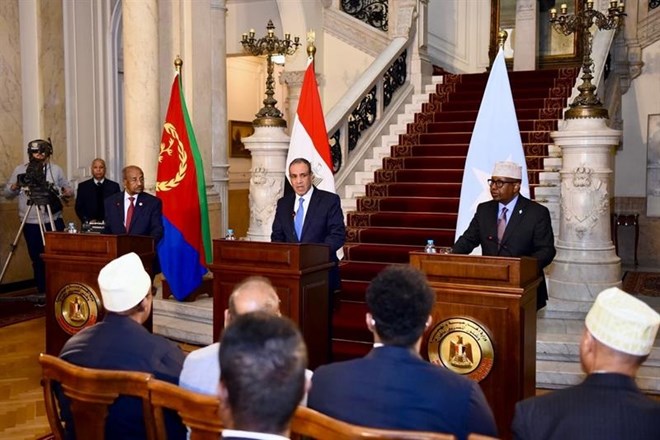Egypt opposes military presence of non-Red Sea nations in the region

Source: HiiraSaturday January 11, 2025

Egyptian Foreign Minister Badr Abdelatty addresses the media during a press conference in Cairo, alongside Eritrean Foreign Minister Osman Saleh and Somali Foreign Minister Ahmed Moalim Fiqi. Photo: Egyptian Foreign MinistryMogadishu (HOL) — Egypt will not tolerate any military or naval presence in the Red Sea from non-littoral states—countries that do not border the sea—Foreign Minister Badr Abdelatty declared during a press conference in Cairo on Saturday. His statement came alongside Eritrean Foreign Minister Osman Saleh and Somali Foreign Minister Ahmed Moalim Fiqi following the first meeting of a trilateral ministerial committee to foster cooperation.
The trio emphasized their commitment to diplomatic coordination, with plans to hold regular ministerial meetings. The next meeting will be held in Mogadishu, while a trilateral summit at the presidential level is also in the works. The collaboration marks a major step in Egypt’s efforts to extend its influence in the Horn of Africa, where it has long sought to maintain dominance over the Red Sea, a vital waterway for global trade and its national security.
During the press conference, Abdelatty reaffirmed Egypt’s support for Somalia’s sovereignty, emphasizing their shared stance against actions that threaten Somalia’s territorial integrity. “We reaffirm our commitment to Somalia’s stability, security, and territorial integrity,” Abdelatty said. Discussions also focused on enhancing Somalia’s institutional capacity to address security challenges, including protecting its land and maritime borders.
The ministers also reiterated their shared vision on the outcomes of the Asmara Summit held in October 2024. The summit brought together leaders from Egypt, Eritrea, and Somalia to discuss regional issues.
Somalia, Eritrea, and Egypt united in opposition to Ethiopia’s controversial port deal with the breakaway region of Somaliland. Ethiopia’s bid to gain access to the Red Sea through Somaliland fueled tensions with Somalia, which views the agreement as a violation of its sovereignty. In response, Somalia moved to strengthen its diplomatic and military ties with Egypt and Eritrea. This new strategic alliance seeks to counterbalance Ethiopia’s increasing regional influence.
On December 11, 2024, Turkish President Recep Tayyip Erdoğan brokered an accord between Somali President Hassan Sheikh Mohamud and Ethiopian Prime Minister Abiy Ahmed. The agreement effectively nullifies Ethiopia’s controversial Memorandum of Understanding (MoU) with Somaliland, reaffirming Somalia’s territorial integrity and sovereignty.
Somali President Mohamud travelled to Ethiopia on Saturday to restore bilateral relations and discuss the implementation of the accord.
The resolution of this dispute has broader implications for regional stability. Egypt, which had previously expressed concerns over Ethiopia’s maritime ambitions, is closely monitoring the situation. President Abdel Fattah al-Sisi has indicated that Egypt is “closely following” the developments, emphasizing the importance of the agreement aligning with international law and contributing to lasting security and stability in the Horn of Africa.
As tensions flare over Ethiopia’s Red Sea ambitions, Somalia has turned to Egypt for support, enhancing its military cooperation and seeking Egypt’s participation in the new African Union Support and Stabilization Mission in Somalia (AUSSOM), a peacekeeping force intended to combat the Al-Qaeda-linked Al Shabab insurgency. Egypt is reportedly requesting a “lead” role in the new mission. Analysts see any contribution as part of Egypt’s broader strategy to bolster its presence and curb Ethiopia’s expanding regional power, particularly concerning access to strategic waterways like the Red Sea.
Egypt’s growing footprint in Somalia is a strategic maneuver to counter Ethiopia’s influence in the Horn of Africa. The development is intricately linked to the longstanding tensions over the Grand Ethiopian Renaissance Dam (GERD), a hydroelectric project on the Blue Nile River that Ethiopia views as vital for its economic development. Egypt, however, has expressed concerns that the dam could disrupt the flow of the Nile, upon which it depends for approximately 85% of its water supply.
